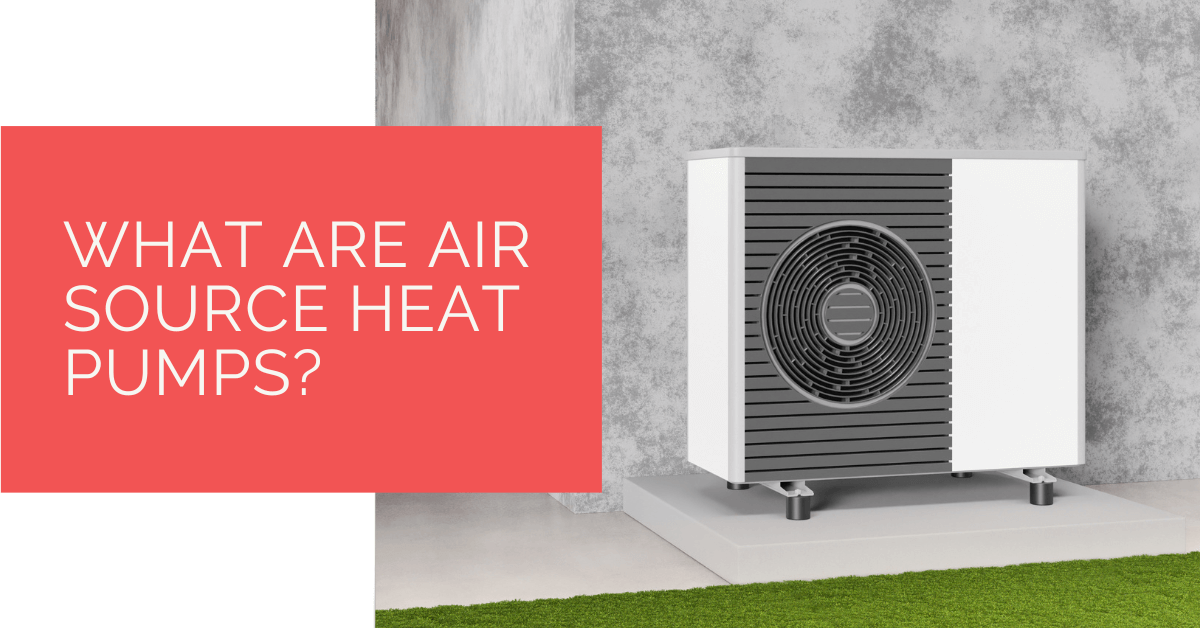There could be many ways of cutting down your expenditure, and one of them is switching to a heating system for your house with low carbon emissions. The initial cost of switching to a renewable energy source heating device can be a little high, but its long-term benefit is worth it.
There are various sources from which heating pumps can derive their energy to produce heat. Heat pumps also use air to produce heat energy from water, ground, and solar panels or solar heat.
An air source heat pump can generate heating and cooling effects for your home. It produces thrice as much energy as produced using an electrical power device. Air source heat pumps are efficient because they transfer the heat from the air instead of converting energy from one form to another.
Apart from monetary issues, using a heating device that runs on a natural source can be a small way of contributing to saving the environment.
Contents
- 1 Key Takeaways
- 2 What Are Air Heat Source Pumps?
- 3 How Air Source Heat Pumps Work
- 4 Types of Air-Source Heat Pumps
- 5 Picking a Heat Pump
- 6 Factors to Consider Before Installing an ASHP
- 7 Advantages of Air Source Heat Pumps
- 8 Disadvantages of Air Source Heat Pumps
- 9 Heat Pump Source: Reliable Heating and Cooling Solutions
- 10 Last Words
Key Takeaways
- Air source heat pumps use the heat from the outdoor air to provide heating and cooling for homes, making them an energy-efficient and environmentally friendly option.
- There are various types of air source heat pumps, including air-to-water and air-to-air systems, with advantages and applications.
- When considering air source heat pumps, factors like cost, insulation, and installer accreditation should be considered. These systems offer low maintenance, long lifespan, and potential savings on energy bills but may have lower heat supply in extremely cold temperatures.
What Are Air Heat Source Pumps?
Air source heat pumps transfer the heat from the air outside into the house space. They produce hot water by heating the radiators using a wet central heating system.
Similarly, they absorb heat from the air to transfer it into another medium. Hence, refrigerators can also use air source heat pumps.
There are air source heat pumps that assist cooling systems as well. Such pumps are set outside your house as they need space for installation.
The main types of heating from air source heat pumps are:
- Air to water heat pumps use outside air to transfer heat to your water heating system to offer hot water heating or radiator. Air to water heat pumps can power underfloor heating systems inside your home.
- Air to air heat pumps soak up heat from the surrounding air and then transport it into your house to heat a room.
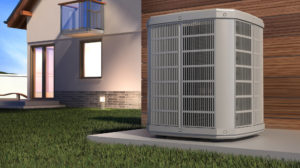
How Air Source Heat Pumps Work
The refrigeration system of an air source heat pump consists of two parts: a pair of aluminium or copper coils and a compressor. The coils have fins made of aluminium, which helps transfer heat. One coil is placed inside the house while the other is outside.
The heat mode of the pump uses the liquid refrigerant from the coil outside the house to extract the air’s heat to evaporate it into gas. After this, the coil inside the house releases refrigerant heat which condenses to a liquid state.
The reversing valve close to the compressor changes the refrigerant’s flow for the pump’s cooling state. This method also defrosts the outdoor coil during winters.
An air-source heat pump’s performance and efficiency depend on:
- Coil design
- Electric motor
- Two-speed compressor designs
- Copper tubes with increased surface area.
- Thermostatic expansion valves
- The type of speed blowers present
Types of Air-Source Heat Pumps
Apart from the type of energy conversion, air heat pumps are of various kinds depending on how they are made:
Based on Duct Type
- Ductless systems: This kind of air pump system requires minimal construction. They only need a three-inch hole through the wall to connect the outdoor condenser with the indoor heads.
- Ducted systems: Perfect for homes that has a ventilation system or will be newly built; these kinds of heat pump systems use ductwork.
- Short-run ducted systems: This system uses extensive ductwork that runs through a small house segment.
Split vs Packaged
In most heat pump systems, split systems use two ducts, one inside and one outside the house. Both of these ducts connect to the indoor central fan.
Usually, both have coils, and the fan is present outdoors in a packaged system. Heated or cooled air reaches the interior from ductwork that passes through a wall or roof.
Multi-Zone vs Single-Zone
For a single room, single-zone systems are efficient. They have one outdoor condenser matched to one indoor head.
Multi-zone installations consist of two or more indoor coils connected to one outdoor condenser.
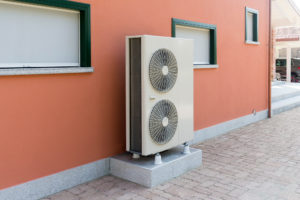
Picking a Heat Pump
All residential heat pumps sold in the UK have an EnergyGuide label. This performance rating shows the energy efficiency of the heat pump. This information will help you compare them with other models.
The heating season performance factor (HSPF) indicates the heating efficiency for air-source electric heat pumps. The seasonal energy efficiency ratio (SEER) indicates cooling efficiency.
In general, the cost of the unit depends on the HSPF and SEER. Replacing an old heating device with a new one will substantially reduce air-conditioning and heating costs as it will use less energy.
The ENERGY STAR® label showing energy efficiency, HSPF and SEER for heat pumps can help you choose the perfect one for your house. Focus on higher HSPF values if you live in a cold environment. In warm regions, focus on getting heat pumps with a higher SEER.
Also, consider these additional factors before choosing an air source heat pump:
Factors to Consider Before Installing an ASHP
Three main factors to consider before installing air source heat pumps:
Costs
Air source heat pump installations usually cost in a range of 8,000- £18,000, depending on the requirement of your home. You can analyse your requirements based on factors if you need additional services such as cooling along with heating, the size of your home, etc. ASHPs are usually much cheaper than ground source heat pumps.
Insulation
Ensure you insulate your home’s interiors for a higher return. Proper insulation saves a lot of energy by keeping the warmth inside your home intact. This would improve the efficiency of any heating system you’re using and is very beneficial in the long run.
Installer
Choose your heat pump installer smartly by ensuring they are correctly accredited and give you a reasonable price for the installation.
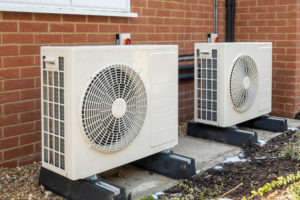
Advantages of Air Source Heat Pumps
Air source heat pumps have low running costs and help you save money on your energy bills. Air source heat pumps are versatile as they can serve both heating and cooling purposes.
Some of the other advantages are:
Eligible for Boiler Update Scheme
The Boiler Upgrade Scheme provides a direct grant to help cover the initial installation costs, making green heating technologies more accessible and affordable. For example, homeowners can receive grants of up to £7,500 for installing air source heat pumps and £6,000 for ground source heat pumps.
Reduced Carbon Footprint
ASHPs use warm air as their heat source, which is a renewable source of energy. They are not dependent on fossil fuels for generating heat, so they heavily cut down your carbon emissions. There’s a looming crisis of climate change in the world. Using renewable energy would be an excellent way to make your contribution to the fight against it.
No Need for Fuel Storage
As the air source heat pumps use the air outside, there is no requirement for fuel storage. You require extra space to store the oil for other boilers, such as the one that uses oil as the source. This also means you don’t have to pay additional money to buy and deliver natural products such as oil or wood.
Trouble-free Installation Process
An air source heat pump needs one or two days for installation. A ground source heat pump requires you to dig for installation, but there is no such hassle in installing an air source heat pump.
A household air source is an ideal option for both retrofits and new builds as it typically doesn’t require planning authorisations. However, it’s always a safe idea to confirm with the regional authority before you begin your installation process.
High Seasonal Coefficient of Performance (SCOP)
Due to its outstanding SCOP (seasonal coefficient of performance), air source heat pumps are energy efficient both in the winter and summer. The COP compares the power input to the heat output to measure a system’s efficiency. A ‘seasonal COP’ figure can be adjusted seasonally.
The COP of air source heat pump vs. outside temperature runs efficiently year-round.
ASHPs Can Be Used for Space Heating and Hot Water
You can also use air source heat pump to heat the water. This depends on the type of system you buy and the water temperature in the heating system. The ideal temperature of the water to heat it properly is 55 degrees Celsius. If you have purchased a system designed to adjust for the heating of the space, then the water temperature (also known as the slow temperature) will be 35 degrees. Therefore if you require a system that fulfils both your heating and hot water needs, make sure that you buy an ASHP with a flow temperature of 55 degrees Celsius.
Sometimes, you may require large quantities of hot water at once, possibly for multiple showers. You can consider getting a hot water cylinder along with the ASHP instead of a gas or combi boiler.
Low Maintenance
Calling a certified technician once in 11-12 months for servicing and maintenance should be enough. Air source heat pumps are usually easy to maintain. By doing some basic checks regularly will optimise their performance. These include keeping the filters clean, maintaining suitable refrigerant levels, checking for leaks in the system, and clearing dirt from your heat pump.
Long Lifespan
Air source heat pumps last up to 20 years with proper maintenance and care. The majority of the air source heat pumps come with a five-year warranty. With the latest technological advancements, modern heat pumps are efficient in operation for up to 25 years before they need replacing, which makes them highly economical.
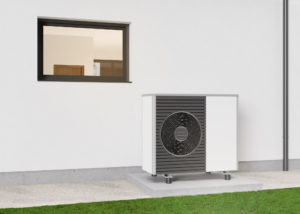
Disadvantages of Air Source Heat Pumps
Air source heat pumps have one crucial disadvantage: they supply a lower heat supply than other alternatives. To utilise your ASHP fully, you might have to consider underfloor heating and a well-insulated home.
These are some of the disadvantages of air source heat pumps:
Lower Heat Supply than Boilers
ASHPs have a lower heat supply compared to oil and gas boilers. So there might be a requirement for larger radiators.
Lower efficiency Below 0°C
Air source heat pumps lose efficiency below 0°C since they are solely dependent on outside air. As the temperature drops, the overall heat output that the pump can produce reduces with it.
Ground source heat pumps are primarily unaffected by cold climates as their pipes are buried deep under the ground, which provides them with a more stable temperature.
Lower Savings Compared to Low Price Mains Gas
The difference between the gas and electricity prices won’t be much if you have access to cheap mains gas. Heat pumps can be a heavy investment for many people. However, the UK is focusing on providing incentives to increase heat pump installations, so you can expect to have more low carbon incentives to make the switch.
ASHPs Can Be Noisy
Air source heat pumps can be noisy while running. Companies are working towards fixing this issue as noise is a significant setback for ASHPs.
Extra Spending to Install Underfloor Heating
To fully utilise your system’s energy, air source heat pumps require underfloor heating to compensate for their low heat supply. This could directly translate to a higher installation cost if your home doesn’t already have an underfloor heating system installed.
Your Home Must Be Well-Insulated Already
A well-insulated system in your home will help you extract the full benefit of an air source heat pump.
If your windows, doors, and walls allow heat to escape, you will need more energy to keep the space warm. Therefore, it is wise for your home to be well insulated.
Heat Pump Source: Reliable Heating and Cooling Solutions
At Heat Pump Source, we take pride in our unwavering commitment to serving the UK with top-tier HVAC solutions. From the efficiency of heat pumps and the cool relief of air conditioning to the warmth of boilers, radiators, and underfloor heating, our dedicated team is always at the forefront of innovation. We understand the unique needs of every household and business, and we strive to provide dependable health and cooling products and services that are tailored just for you. Ensuring your comfort and satisfaction is our utmost priority. Whether you have questions, need guidance, or require support, we’re always here to assist. Please don’t hesitate to contact us; we’re eager to be of service.
Last Words
Air source heat pumps could be a wise choice for your home if your energy requirement is not very high. It is friendly to your pocket in the long term and can serve your home with its heating and cooling needs. The installation process is quick and budget-friendly as long as you have a well-insulated home and underfloor heating.
Many other heating devices are available; you must consider everything before choosing the most suitable system for your home. Air source heat pumps are also environmentally friendly as they make use of natural renewable energy as the source to generate heat. Using them, you can contribute to the fight against climate change by reducing the carbon footprint of your house.
This article consists of all the necessary factors to consider making the right choice for your heating pump requirements.
About the Author
At Heat Pump Source, our articles are the product of a collaborative effort among a team of highly skilled HVAC experts. Our dedicated professionals, hailing from diverse backgrounds in heating, ventilation, air conditioning, and refrigeration, contribute their extensive knowledge and experience to every piece of content. This multidisciplinary approach ensures comprehensive coverage. Our commitment is to deliver authoritative, reliable, and tailored advice to meet the unique needs of every household and business across the UK.

